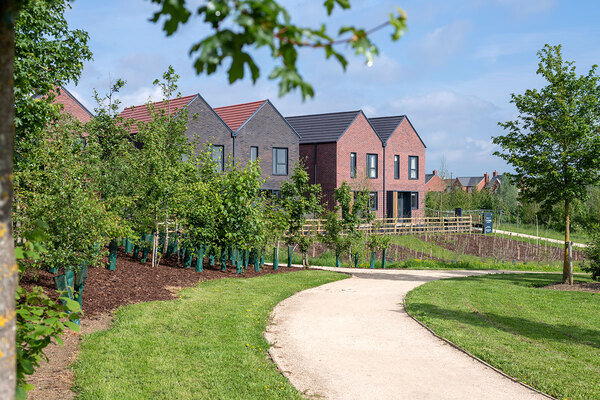You are viewing 1 of your 1 free articles
‘Applause for carers has to be backed up by other forms of recognition’
A new report seeks to evidence why the state should overturn years of neglect and invest in more social housing for older people. Jane Ashcroft, chief executive of Anchor Hanover, which commissioned the work, talks to Martin Hilditch about why the current environment makes it more important than ever to win that argument. Picture by Getty
On Thursday last week at 8pm, millions of people across the UK stood on their doorsteps and clapped for carers.
It has been an astounding show of support. But it has also kick-started a debate about the extent to which people and organisations that provide care have been undervalued and overlooked in the past. As the applause fades, the big question remains: what happens next? Surely this is one area where we do not want to return to ‘normal’?
“Applause isn’t going to put the food on people’s table”
Jane Ashcroft, chief executive of housing and care provider Anchor Hanover, is among those pushing for change.
She says she has been pleased with the way the national conversation has opened up beyond the initial “heroic doctors and nurses agenda”. For instance, she says she has also been clapping “for the people who work in our sheltered housing, the frontline carers in our care homes, our maintenance teams”.
Nice though it might be, the weekly demonstrations of appreciation only do so much, Ms Ashcroft suggests.
“It has to be backed up by other kinds of recognition,” she states. “Applause isn’t going to put the food on people’s table.”
Thrust into the conversation with impeccable timing this week is a piece of research that Anchor Hanover commissioned before the pandemic in a bid to bounce supported housing up the local and national agenda.
The work, carried out by consultancy Sonnet Advisory and Impact, attempts to put a value on the landlord’s rented retirement and extra-care housing.
With a combination of hope and hyperbole, Anchor Hanover suggests the findings should have “far-reaching implications for all providers and commissioners”.
So, what did the study find, what precisely are those far-reaching implications and – the £64,000 question – how likely are they to drive change?
Using a combination of literature reviews, workshops and interviews and an online survey of around 200 residents, the researchers concluded that there would be combined savings of £6,200 as a result of living in specialist social housing.
This includes savings to the health service through reduced risk of falls and depression and anxiety, along with savings to local authorities which would otherwise be housing people in more costly temporary accommodation.
“I spend a lot of time trying to explain to people why we think retirement housing has an important part to play in the housing crisis”
Cheaper rents mean reduced levels of debt, and the specialist nature of the housing means shorter hospital stays as people can be released much earlier into suitable supported accommodation.
On top of homes that are designed to help older people live independently, the association fully funds minor adaptations up to the value of £1,000, such as grab rails or ramps. The report says that major adaptations are typically funded by councils via the Disabled Facilities Grant, but Anchor Hanover offers a 40% contribution to the cost either to the council or the resident if they do not qualify for the grant.
Tenancies also bring access to the association’s BeWise service, which provides residents with various support with benefits and bills, and the researchers found that saves residents an average of £6,000 each (last year Anchor Hanover suggested it had saved £10m collectively over a six-and-a-half year period). For every resident in extra care, the report suggests there would be average savings of £6,700 a year to local authorities.
Ms Ashcroft is clearly passionate about the message. For starters, it will help her own arguments moving forward. “I spend a lot of time trying to explain to people why we think retirement housing has an important part to play in the housing crisis,” she states. “There is a need to invest in social housing for the older generation.”
As the report makes clear, it is an argument that has often fallen on deaf ears in the past. With more than two million people over the age of 65 living in relative poverty, it is clear there is a need now – and this is only going to grow in the years to come.
Last year, research by Shelter revealed that a quarter of private renters age 65 and over worry about becoming homeless.
And due to the growth of the private rented sector and contraction of social housing, it is a problem that is likely to get worse.
A Shelter poll of 3,995 private renters found that 67% of 55 to 64-year-old private renters say they would not be able to pay rent on a suitable home when they retire without needing housing benefit. And 48% were worried that the cost of renting means they will not be able to afford to retire.
We are not making plans to deal with future need, though. A survey done last year by housing association Habinteg of 322 local plans in England found that less than half set a specific requirement for a proportion of new homes to meet any form of accessible housing standards.
It also found that just 1% of new homes outside London are set to be suitable for wheelchair users, despite there already being 1.2 million wheelchair users in the UK as well as an ageing population.
“We know that there is underprovision of retirement housing across all tenures,” Ms Ashcroft states. It is the delivery of social housing for older people that is particularly concerning, she suggests. “There hasn’t really been much support for social housing for people in later life.”
“We have lots of people on our waiting list and the options for them are very limited,” she adds. “Outside of the social housing sector, you are very unlikely to access something like the BeWise service.”
Then there are issues of housing conditions too, she says. A quarter of English homes in the private rented sector are non-decent, according to the English Housing Survey, compared with 11.3% of housing association homes and 14.8% of council housing. Ten per cent of private homes fail thermal comfort standards, compared with 3.6% of council homes and 4.9% of association properties.
“I think [low wages] will be increasingly considered unacceptable for people using services”
Along with the report, Ms Ashcroft hopes that the recent focus on key workers and carers will also lead to a re-evaluation of the importance of the sector.
While everyone at Anchor Hanover earns above the National Living Wage, this is not the case for much of the sector, and frontline care roles are far from lucrative.
Particularly at the moment, staff are working in “hard, demanding environments” with many likely to be struggling with their own housing costs. It is with this in mind that as well as influencing national debates about the need to build fund more social housing for older people, Ms Ashcroft also wants to influence conversations about commissioning rates for care.
“A significant element of our cost base is our workforce,” she says. “If we are going to reflect on the contribution made by carers properly, we do have to think about where the income comes from.”
The recent focus on carers opens up the conversation more widely, and Ms Ashcroft thinks that remuneration will more regularly be an issue that residents and their families will scrutinise, too.
“I think [low wages] will be increasingly considered unacceptable for people using services,” she states. “They will be saying, ‘I want to know that the person providing this service to me has been properly recognised.’”
Of course, the coronavirus crisis brings challenges for providers too, and that means a focus on existing housing as well as new build. Anchor Hanover is currently reviewing the design of its properties to see which have enabled it to most successfully deliver a homely environment and support people in a COVID-19 world.
“Because we have got such a large stock and a lot of different designs, we are looking at what has been helpful and what has been challenging during the pandemic,” Ms Ashcroft explains.
“We will be living in a world like this for a number of years [so it is important to implement changes].”
The shortage of housing for older people is only going to grow in importance. Over the course of her career, Ms Ashcroft says that “it’s gone from being something where nobody really talked about ageing to a much more central conversation”.
The applause for carers and the broader focus on the care sector during the pandemic mean that more people are joining in the conversation than ever before. They will all have been empty gestures though if that does not transfer to delivery and real change on the ground.
Sign up for the IH long read bulletin
Already have an account? Click here to manage your newsletters












